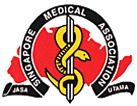
THESMANEWS
Present Issue
Past Issues
Journals
Present Issue
Past Issues
Letters to the Editor

![]()
This site is supported by Health ONE
PRESIDENT'S FORUM / NEWS FROM COUNCIL /
MEDICAL OFFICERS' COLUMN
President's Forum
Congratulations To The Associate Deans
The appointment of Associate Deans in the four teaching hospitals is an important event in the medical education of Singapore. The Singapore Medical Association joins the Dean and the Minister for Health in congratulating the four doctors, Dr Low Boon Yong of Changi General Hospital, Clinical Associate Professor Ho Nai Kiong of KKWCH, Clinical Associate Professor Charles Ng of Singapore General Hospital and Clinical Associate Professor Low Cheng Hock of Tan Tock Seng Hospital.
We are also pleased to note that Clinical Professor Ho Nai Kiong is a member of the SMJ Editorial Board. Clinical Professor Low Cheng Hock is a Council Member of the Singapore Medical Association, and Chairman and member of several SMA Committees in the past two years.
The hallmark of medical excellence as a nation is the clinical competence and acumen of its doctors, not only the specialists but also the primary care doctors as well. Apart from the undergraduates, there are four groups of junior doctors to train, namely, the house officers, the hospital specialty trainees, the family medicine trainees and the non-trainee medical officers. The Association supports the Associate Dean scheme and welcomes the opportunity for better supervision and training of our undergraduate students and postgraduate doctors.
The Minister for Health, in his speech at the Ceremony on the appointment of the Associate Deans also spoke of continuing medical education (CME) as one of the two issues that are challenges to the medical profession world-wide; the other issue being ethical practice.
On CME, he said, "The Singapore Medical Council is working towards a more comprehensive system of monitoring CME for all registered medical practitioners. This will help ensure that Singaporeans have access to the most cost-effective medical treatment."
The development of a CME programme that helps the doctor acquire up-to-date knowledge and skills to practise cost-effectively is important. This concept needs to be further studied. I invite members to write in on this subject. The topic will be discussed in a future forum.
DR CHEONG PAK YEAN
News From Council
1. Membership of SMA
Council is pleased to announce that the SMA Membership now stands at 3378. This constitutes 68.5% of all registered members of the SMC Register. This is the first time that the SMA represents more than two-thirds of the medical profession in Singapore.
2. Direct Marketing of Medicines
The SMA Council has written to the Ministry regarding the issue of advertisements of medicinal products. This arose from an enquiry to the SMA Ethics Committee pertaining to the involvement of certain doctors in marketing activities of ethical medicine to the public.
The following are excerpts of the reply from Dr Ho May Ling, Acting DDMS (Service Regulation) with regards to the control of advertisements by the Medicines Act. The ethical considerations governing doctors’ involvement is governed by the Singapore Medical Council and are stated in the SMC Ethical Code.
"The Medicines Act controls advertisements of medicinal products. All such advertisements meant for the general public require prior approval from MOH but those meant for health professionals like doctors and pharmacists are exempted if they comply with Section 50 of Medicines Act. Under Section 50 of the Medicines Act, advertisers of a registered medicinal product can only make recommendations for medicinal purposes that are approved in the product licence, even if the advertisement is meant for health professionals. In addition, section 50 prohibits the issue of a false or misleading advertisement or representation of any unregistered medicinal products in connection with its sale to both the health professionals and general public.
"Generally, any activity, including media workshop and briefing, carried out with an intent to introduce or publicise a medicinal product to the general public is considered as a medical sales promotion, which would require prior approval from the Ministry under regulation 3(b) of Medicines (Medical Advertisements) Regulations."
3. WHO Alert on AbTox Plazlyte Sterilisation System
(see page 325).
Medical Officers' Column
Do You Know...Your Leave Benefits?
Do You Know ...
YOUR LEAVE BENEFITS?
_ Part 1
Annual Leave
How much vacation leave you get every calendar year depends on which Division you are in and how long you have been in Service.
Length of service Division I & II officers
Less than 10 years 21
10 years and more 28
Half day leave taken on Saturdays can only be taken up to a maximum of 6 Saturdays a year. Anything more will be considered as a full day leave.
Leave taken on the eve of any major festival will be considered a full day even if it is a half working day.
Unused annual leave will be carried forward to the next year as accumulated leave. If it still remains unused at the end of the year, it will be automatically converted to pay at the rate of 1 day’s pay for 1 day’s leave up to a maximum of 14 day’s pay for Division I & II Officers. K